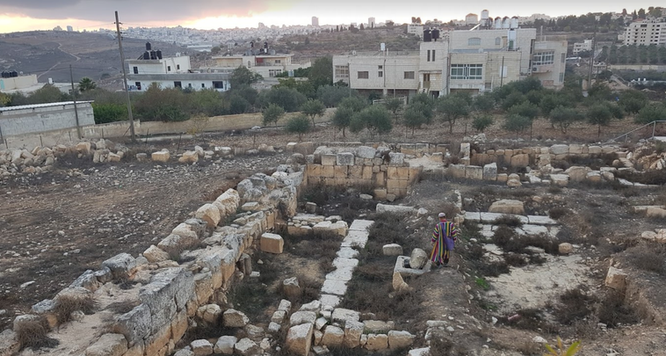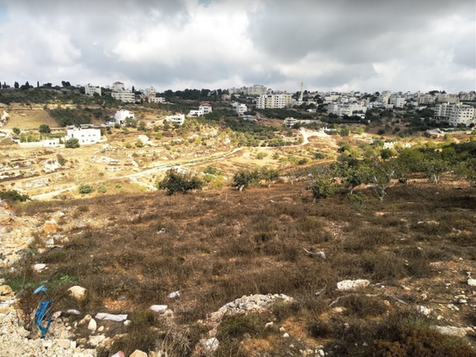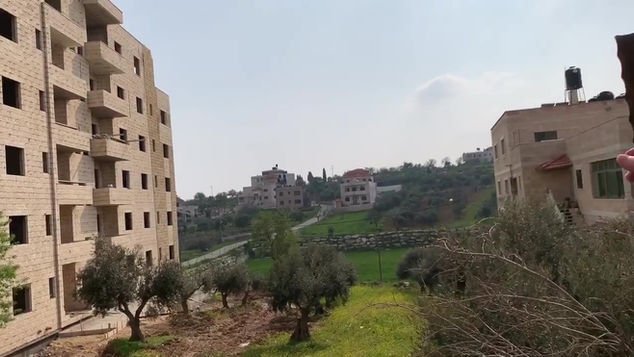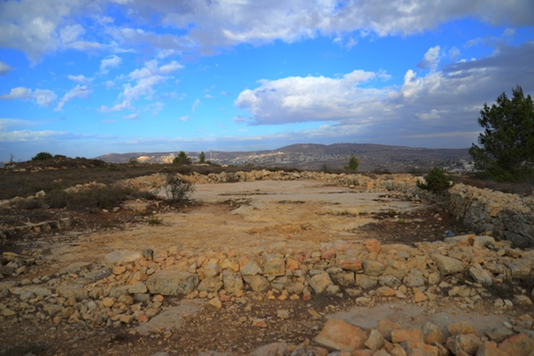

Bethel (Beit El) Overview
Photo Gallery
Places of Interest
Bethel
Introduction
1. Near Bethel, Abraham built one of the first altars mentioned in the Bible, and there he “invoked the name of the Lord.”
2. After Abraham fled to Egypt to escape a famine in the Holy Land, he returned to the same place near Bethel and again invoked the name of the Lord.
3. When Jacob was fleeing from his brother Esau, he stopped for the night at Bethel, where he had a dream.
4. Jacob moved to Bethel to live after he returned to the Holy Land. God spoke to him and changed his name from Jacob to Israel.
5. Bethel was a place where the Tabernacle resided for some time during the period of the Judges.
6. After the Kingdom of Israel was divided, Jeroboam, the king of the northern kingdom, set up golden calves in Bethel and Dan.
Location
1. Bethel (originally called Luz in the Bible) is in the hill country of the Samaria region about 10 miles (17 km.) north of Jerusalem.
2. Bethel stood at several main crossroads in Israel. It was on the main north-south road that passed through the central hill country from Hebron in the south to Shechem in the north, and it was on the main east-west route leading from Jericho to the Mediterranean Sea.
3. In addition to the main city of Bethel, which today is called, Baytin or Beit El, there are two other key sites close to the main city of Bethel.
-
The first is the original place where Abraham and Jacob pitched their tents and erected altars. This is located just outside Bethel toward the south, a short distance.
-
The second is the high place of worship. It's about 1.5 miles (2.5 km.) north of the main city of Bethel. It's one of the highest places in Israel, sitting at an elevation of 2,900 ft. (886 m.). For this reason, it was a place of worship, both to God and false gods. It's believed the tabernacle resided here for some time during the period of the Judges and was the place Jeroboam set up one of his Golden-Calf altars after the Kingdom of Israel divided. Today, this high place of worship has been recognized by the Israeli government and is called Khalom Ya'akov Antiquities Site. It's fenced and secured.
Historical Background
1. Bethel is mentioned sixty times in the Bible, representing over thirty distinct stories and prophecies, all found in the Old Testament. Only is Jerusalem mentioned more times in the Bible than Bethel.
2. Bethel means “House of God.”
3. The site of Bethel, the close by sites of Abraham and Jacob, and the high place are all holy to Christians, Jews, and Muslims. They have artifacts, buildings, tombs, and ruins pertaining to each religion.
Places of Interest
1. The site where Abraham and Jacob pitched their tents and built altars.
There are ruins at this site which provide strong evidence that this was the place Abraham and Jacob pitched their tents and built altars. Later, a Byzantine church was erected here, marking this spot. Jerome (347-420 AD), an early Christian leader, confirms this. He wrote the following about this site: "There is also a church built where Jacob slept as he passed to Mesopotamia."
2. The original city of Bethel.
This site was once excavated and revealed walls, buildings, and remains of ancient Bethel. It has since been abandoned and filled in by those living in the area. However, some remains can still be seen in various places.
3. The high place of worship.
1. Muslim Prayer Shrine
2. Crusader Chapel
3. 1,000-year-old oak tree, and other ancient trees (trees were never cut at holy sites).
4. Walls of a Byzantine Church
5. Walls & towers of protection – these would have been used during times of war between Judah and Israel after the nation divided.
6. Burial Tombs
7. Ruins of a foundation measuring the exact size of the tabernacle.
8. Jeroboam’s Golden-Calf Altar
Bethel in the Bible
1. It was near Bethel that Abraham built one of the first altars mentioned in the Bible, and there he: “invoked the name of the Lord.”
Genesis 12:8: From there he moved to the hill country on the east of Bethel and pitched his tent, with Bethel on the west and Ai on the east. And there he built an altar to the LORD and called upon the name of the LORD.
2. After Abraham fled to Egypt to escape a famine in the Holy Land, he returned to the same place near Bethel, and once again invoked the name of the Lord.
Genesis 13:2–4: Now Abram was very rich in livestock, in silver, and in gold. 3 And he journeyed on from the Negev as far as Bethel to the place where his tent had been at the beginning, between Bethel and Ai, 4 to the place where he had made an altar at the first. And there Abram called upon the name of the LORD.
3. When Jacob was fleeing from his brother Esau, he stopped for the night at Bethel, where he had a dream.
Genesis 28:10–22: Jacob left Beersheba and went toward Haran. 11 And he came to a certain place and stayed there that night, because the sun had set. Taking one of the stones of the place, he put it under his head and lay down in that place to sleep. 12 And he dreamed, and behold, there was a ladder set up on the earth, and the top of it reached to heaven. And behold, the angels of God were ascending and descending on it! 13 And behold, the LORD stood above it and said, “I am the LORD, the God of Abraham your father and the God of Isaac. The land on which you lie I will give to you and to your offspring. 14 Your offspring shall be like the dust of the earth, and you shall spread abroad to the west and to the east and to the north and to the south, and in you and your offspring shall all the families of the earth be blessed. 15 Behold, I am with you and will keep you wherever you go, and will bring you back to this land. For I will not leave you until I have done what I have promised you.” 16 Then Jacob awoke from his sleep and said, “Surely the LORD is in this place, and I did not know it.” 17 And he was afraid and said, “How awesome is this place! This is none other than the house of God, and this is the gate of heaven.” 18 So early in the morning Jacob took the stone that he had put under his head and set it up for a pillar and poured oil on the top of it. 19 He called the name of that place Bethel, but the name of the city was Luz at the first. 20 Then Jacob made a vow, saying, “If God will be with me and will keep me in this way that I go, and will give me bread to eat and clothing to wear, 21 so that I come again to my father's house in peace, then the LORD shall be my God, 22 and this stone, which I have set up for a pillar, shall be God's house. And of all that you give me I will give a full tenth to you.”
4. When Jacob was in Paddan-aram, God told him to return to the land of Israel.
Genesis 31:13: I am the God of Bethel, where you anointed a pillar, where you made a vow to Me; now arise, leave this land, and return to the land of your birth.
5. After Jacob returned to the Holy Land, he moved to Bethel to live. God spoke to him and changed his name from Jacob to Israel.
Genesis 35:1: Then God said to Jacob, “Arise, go up to Bethel and live there, and make an altar there to God, who appeared to you when you fled from your brother Esau.”
Genesis 35:9-15: Then God appeared to Jacob again when he came from Paddan-aram, and He blessed him. 10 God said to him, "Your name is Jacob; You shall no longer be called Jacob, but Israel shall be your name.” Thus, He called him Israel. 11 God also said to him, “I am God Almighty; be fruitful and multiply; a nation and a company of nations shall come from you, and kings shall come forth from you. 12 The land which I gave to Abraham and Isaac, I will give it to you, and I will give the land to your descendants after you.” 13 Then God went up from him in the place where He had spoken with him. 14 Jacob set up a pillar in the place where He had spoken with him, a pillar of stone, and he poured out a drink offering on it; he also poured oil on it. 15 So Jacob named the place where God had spoken with him, Bethel.
6. Bethel was a place where the Tabernacle resided for some time during the period of the Judges.
Judges 20:26–27: Then all the people of Israel, the whole army, went up and came to Bethel and wept. They sat there before the LORD and fasted that day until evening, and offered burnt offerings and peace offerings before the LORD. 27 And the people of Israel inquired of the LORD (for the ark of the covenant of God was there in those days).
7. After the Kingdom of Israel was divided, Jeroboam, the king of the northern kingdom, set up golden calves in Bethel and Dan.
1 Kings 12:26–29: And Jeroboam said in his heart, “Now the kingdom will turn back to the house of David. 27 If this people go up to offer sacrifices in the temple of the Lord at Jerusalem, then the heart of this people will turn again to their lord, to Rehoboam king of Judah, and they will kill me and return to Rehoboam king of Judah.” 28 So the king took counsel and made two calves of gold. And he said to the people, “You have gone up to Jerusalem long enough. Behold your gods, O Israel, who brought you up out of the land of Egypt.” 29 And he set one in Bethel, and the other he put in Dan.
8. God warned Jeroboam about erecting the golden calves at Bethel. Jeroboam’s arm withered and was then restored by a prophet to show Jeroboam that God was serious about his great sin. However, Jeroboam did not heed God’s warning (1 Kings 13:1–34).
9. The continual disobedience of Jeroboam, and the succeeding kings, sealed the fate of Bethel. By the time of Jesus’ birth, Bethel had completely faded away as a place of importance and is not mentioned anywhere in the New Testament.
10. Josiah, a righteous king, destroyed the Golden-Calf Altar Jeroboam erected at Bethel.
2 Kings 23:15: Moreover, the altar at Bethel, the high place erected by Jeroboam the son of Nebat, who made Israel to sin, that altar with the high place he pulled down and burned, reducing it to dust. He also burned the Asherah.
11. Just before Elijah ascended to heaven, he and Elisha were in Bethel.
2 Kings 2:1–3: Now when the Lord was about to take Elijah up to heaven by a whirlwind, Elijah and Elisha were on their way from Gilgal. 2 And Elijah said to Elisha, “Please stay here, for the Lord has sent me as far as Bethel.” But Elisha said, “As the Lord lives, and as you yourself live, I will not leave you.” So they went down to Bethel. 3 And the sons of the prophets who were in Bethel came out to Elisha and said to him, “Do you know that today the Lord will take away your master from over you?” And he said, “Yes, I know it; keep quiet.”
12. After Assyria conquered and exiled the Northern Kingdom of Israel, the king of Assyria sent one of the captured Israelite priests back to Bethel to teach the people from other nations who lived in Israel how to worship Yahweh, the true and living God (2 Kings 17:24–41).
Faith Lesson from Bethel
1. Bethel was a place of two different kinds of responses to God.
-
It was a place where Abraham and Jacob had special encounters with God and worshiped Him, and a place where the Ark of the Covenant dwelt, which represented the presence and glory of God.
-
Unfortunately, it also represents a place of disobedience to God and the worship of false gods and idols.
2. We could learn a great lesson from this biblical site of Bethel.
3. Are we going to be like those who worshiped and obeyed God, or like those who disobeyed and worshiped their own desires and plans?
Travel Guide Book
664 Pages
Bible Companion Book
654 Pages
Biblical Sites
Israel Overview Tour of All Biblical Sites
Jerusalem Sites
Chapel of the Ascension: Ascension & Return of Christ
Death, Burial, Resurrection of Christ
Garden of Gethsemane: Church of All Nations
Herod/Pilate's Palace: Trial of Jesus
House of Caiaphas: Peter's Denial of Christ
Kidron Valley: Judgment of God
Pater Noster Church: Lord's Prayer, Olivet Discourse
Church
Prophecy, Proof the Bible Is True: Mount of Olives
Southern Stairs/Davidson Archaeological Site
The Old Testament Feasts & Jesus
Zedekiah's Cave & Solomon's Quarry
Sea of Galilee Sites
Capernaum: Jesus' Ministry Base
Gennesaret, Ginosar: Jesus Boat
Boat Ride: Jesus Walks on Water, Calms the Sea
Mount Arbel: The Great Commission
Sower's Cove: Parables of the Kingdom
Other Sites Around the Sea of Galilee
Northern Israel Sites
Caesarea Maritima: Holy Spirit Given to the Gentiles
Church of the Annunciation & St. Joseph Church
Mount Tabor: Transfiguration of Christ
Other Sites In Northern Israel
Central Israel Sites
Gezer: On Crossroads of the World
Jordan River: Crossing into the Promised Land
Jordan River Baptismal Site of Jesus (Qsar al-Yahud)
Judean Wilderness: Testing of Jesus
Philistine Cities of Ashkelon, Ashdod, Gaza, Ekron, Gath
St. George's Monastery (Wadi Qelt)
Valley of Elah: David & Goliath
Southern Israel Sites
Exodus, Red Sea Crossing, Mt. Sinai
The Philistines & Their City Strongholds
Other Sites In Southern Israel
Other Biblical Sites
Exodus, Red Sea Crossing, Mt. Sinai
Other Biblical Videos
Life & Ministry of Jesus Series
Jewish Holy Days & How Jesus Fulfills Them
Future of Israel: Its Wars, Conflicts, Prophecies
What Are the Differences Between Islam and Christianity?
Who Has the Rights to the Holy Land? Jews or Arabs?
What Is the Reason for the War and Conflicts in Israel and the Middle East?



























